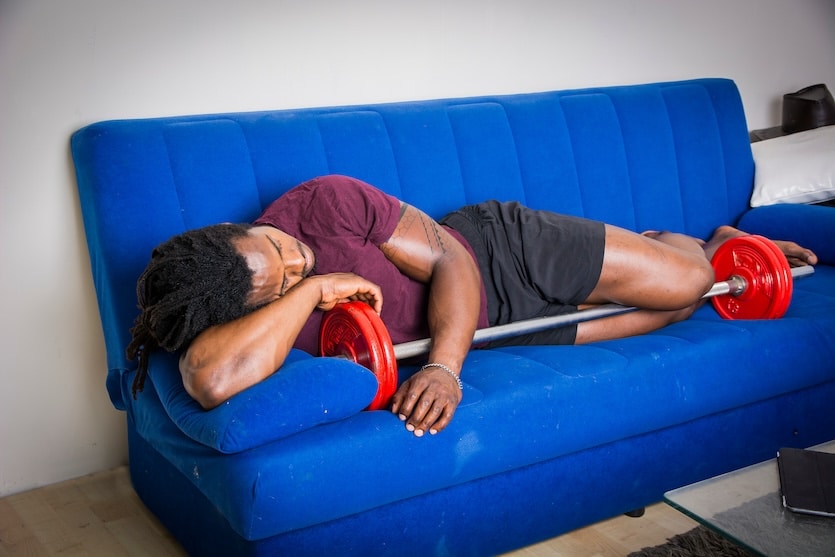How the Body Uses Sleep to Bulk Up

There are few things more frustrating than hitting the gym regularly only to see lackluster results. If you’ve been in this situation, there’s a good chance you’ve already addressed the usual culprits: nutrition, hydration, and the structure of your workouts. (If not, this article is a great starting point!)
Here’s the thing—building and maintaining muscle requires a holistic approach to health and fitness. This means that nearly every element of your lifestyle impacts your body’s ability to build and repair its muscle tissue. So, if you’re training well, eating well, and drinking plenty of water, it’s time to look at your sleep habits.
Muscle Breakdown and Repair: Understanding Muscle Growth
People often describe strength training as repeatedly working your muscles to the point of failure. Basically, this means repeating a weightlifting motion until you can’t complete any more reps. As you do this, your muscles experience more strain than they normally do. This creates microscopic tears, or microtears, in the muscle tissue. (It’s important to note that these microtears are not the same as muscle tears, injuries often sustained in sports that can have long-lasting effects on mobility.)
It might seem counterintuitive, but it is these microtears that make muscle growth possible. As your muscles break down, your body sends new cells to the affected tissue to help repair it. Over time, these repairs form new protein strands, which are what muscle tissue is made up of.
In short, when we talk about muscle growth, we are actually talking about this cycle of breakdown and repair in muscle tissues.
More Than Just Beauty Rest: Sleep and Muscle Repair
If muscle growth requires breakdown and repair, where does sleep come in? Obviously, you’re not bringing your muscles to the point of failure in your sleep. Sleep does, however, play an important role in muscle repair—let’s take a look at why.
Human growth hormone
One of the key elements of muscle repair is the human growth hormone (HGH), a hormone that is naturally produced in the pituitary gland. This hormone is often discussed in relation to childhood and adolescent health, as it plays an important role in body growth and development. For adults, HGH still plays a vital role in the body—it helps the body build new muscle mass.
The pituitary gland does not constantly secrete human growth hormone. It releases HGH in response to certain events, including exercise, trauma, and sleep. Typically, the body produces and secretes more HGH at night than during the day. And sleep greatly heightens the levels of HGH being released into the body.
Glycogen stores
Another element of muscle growth and performance is the glycogen stored within your muscles. During physical activity, your muscles need to get energy somewhere—usually, this takes the shape of glycogen, a type of glucose that is stored in muscle tissue. At any given time, however, there is a finite amount of glycogen available for your muscles to use. Over the course of a workout, your muscles deplete their glycogen stores; this is when you begin to feel fatigue.
During sleep, your body replenishes the glycogen stores in your muscles, allowing you to maintain a rigorous workout routine day after day. Without adequate sleep, however, your muscles will feel far more fatigued, as their glycogen stores will not be fully replenished.
Amino acids and protein synthesis
As mentioned above, the elevated levels of human growth hormone present during sleep make it a prime time for muscle repair and growth. In order to grow and repair, however, your muscles also need protein. Many people time their protein consumption around their workout, consuming most of their dietary protein immediately following a workout. This is a good practice, but studies show that you can also improve muscular growth by consuming high amounts of protein before bed.
Current hypotheses suggest that many active individuals squander the opportunity provided by a good night’s sleep. By the time most active people are hitting the hay, their body has already synthesized the protein they’ve consumed. This leaves no protein to aid with overnight muscle repair and development. One study suggests that consuming about 40 grams of protein immediately before bed can lead to drastic increases in overnight protein synthesis and muscle growth.
REM and non-REM sleep
Not all sleep is created equal—but as someone who sleeps every day, you probably knew that. Sleep can actually be divided into two categories: rapid eye movement (REM) and non-rapid eye movement (NREM). Typically, about 20% of sleep is REM sleep. During this type of sleep, your brain is active and performing vital tasks such as memory formation. This is also when most dreams occur.
The other 80% of sleep is NREM sleep, which can actually be further divided into three stages: stage 1 (somewhere between wakefulness and sleep), stage 2 (light sleep), and stage 3 (heavy sleep). During stage 3 of NREM sleep, your body begins to physically repair itself, making it a vital stage of sleep for muscle growth and maintenance.
Sleep Deprivation and Strength Training
So far, we’ve covered all of the ways that sleep can help with muscle growth and recovery, but what about the opposite? Let’s take a look at how a lack of sleep can impact your muscle growth.
As mentioned above, your muscles’ glycogen stores are replenished during sleep. This can have a direct impact on your ability to properly train. If you are not getting enough sleep, your muscles might not have access to adequate glycogen during subsequent workouts, causing you to experience fatigue much sooner. And if you frequently have to cut workouts short due to fatigue, you may experience plateaus in your progress.
Additionally, your body produces and releases less human growth hormone when you are sleep deprived. This means you are depriving your muscles of one of the key ingredients for recovery and growth.
Sleep deprivation can also increase risk of injury and overtraining. If you are not giving your muscles adequate time to repair and grow, especially during sleep, they are less prepared to take on rigorous workouts. Ignoring this can lead to strain and injury.
Protein and Sleep: A Multifaceted Look at Muscle Growth
Nutrition is perhaps the most important element of muscle growth aside from exercise and training. Your body needs protein to repair and build muscle tissue—and you’re only going to get that protein through your diet.
If you’re already getting enough protein each day, it’s time to start optimizing the timing of your protein consumption. After a workout is a great time to get your body some protein, but it’s not the only time frame you should be targeting. Between the release of human growth hormone that occurs during sleep and the general bodily repairs that occur during stage 3 of non-REM sleep, your body is actually capable of building and repairing muscle while you’re asleep.
Here’s the problem: most people eat their protein earlier in the day. By the time they’re asleep, the nutrients their bodies need to build muscle are no longer readily available. Fortunately, the solution is easy enough—just eat some (40 grams, according to one study) of your daily protein before going to sleep.
The Bottom Line
Sleep is a time to recharge, not just mentally but also physically. While you’re asleep, your body performs a wide variety of vital bodily functions, which include building and repairing muscle tissues.
While it is still possible to build muscle mass without a full night’s sleep, your results will not be optimal. Sleeping enough each night gives your body time to repair damaged muscles and replenish glycogen stores, allowing you to hit the gym and train just as hard day after day.
References
https://www.ncbi.nlm.nih.gov/pmc/articles/PMC5188418/
https://www.betterup.com/blog/sleep-for-muscle-recovery
https://www.healthline.com/health/food-nutrition/protein-before-bed#research
https://www.sciencedirect.com/science/article/abs/pii/S1440244021001328
https://welltory.com/sleep-and-recovery/
https://www.health.harvard.edu/diseases-and-conditions/growth-hormone-athletic-performance-and-aging






